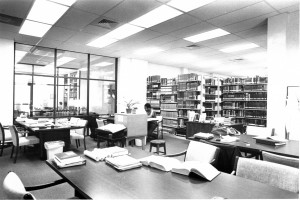By now, most people know that the contents of the Chemistry Library were moved over to Little last summer in order to make room for a new faculty office in Martin.
The move happened quickly — really quickly! — with little advance warning. We didn’t have the space to shelve the materials in the regular collection, so we had to find — and cobble together — temporary shelves.
The temporary shelves are just that, though: temporary. Our goal is to integrate the Chemistry Library materials into the rest of the collection, but because we are so short of space, anything that we add to Little Library collections now needs to go in the LC collection. Since nearly all of the Chemistry Library books had Dewey call numbers, and since this collection had not been fully evaluated for many years, I’ve been going through all of the books that came over from Martin and, in consultation with the chemistry faculty, identifying titles that need to be retained, editions that need to be updated, and damaged, superseded, out-of-date, or little-used books that we no longer need to retain.
It is proving to be a memorable conversion experience, and like many conversion experiences, it has been sudden, transformative, challenging, and a little messy. With this conversion, there is no turning back.
The Oxford English Dictionary offers several definitions of conversion, and a number of these seem quite appropriate to our current situation.
II. Change in character, nature, form, or function.
11. a. The action of turning, or process of being turned, into or to something else; change of form or properties, alteration.1
The change from Dewey to LC is certainly a functional change that will improve access and bring similar materials together, both physically and, in Davidson Library WorldCat, virtually. In addition, the integration of Martin and Little books benefits all users, since, once the project is completed, all chemistry books will be shelved together. This is very much a positive change.
III. Change by substitution of an equivalent in purport or value.
As I’ve been going through the collection, I’ve let the chemistry faculty know when newer editions and other formats, such as e-books, are available. We’ve updated numerous titles and migrated many books, including reference sets, to online. These “substitutions” have resulted in a more up-to-date collection and easier access to frequently-used reference information.
In short, this conversion is producing many positive results, with more to come.
As I mentioned, though, conversion can be a little messy until it “takes” and is complete.
The OED provides apt definitions in this context, as well.
II.
11. b. Change of condition or function. (Const. into.)
When we moved the materials from Martin last summer, we shelved them on temporary shelves in four different areas of the library; we didn’t have space to keep them all together. As we’ve evaluated, updated, and converted books, we’ve had to add five additional, temporary locations. In sum, the Chemistry Library books can now be found in nine different places in the library: converted books are (1) in the reference stacks, (2) LC stacks, or (3) on top of microform cabinets in the basement (because we will have to shift the LC stacks in order to make room for all the “QDs”); books currently being evaluated are (4) on carts in my office, (5) on former cataloging shelves outside my office, or (6) on empty shelve in the staging area; books that need to be converted are (7) on carts in the staff area; and books that still need to be evaluated are (8) on temporarily shelves beside the reference stacks or (9) on the former “Art identification” shelves in the basement.
This is a “change of condition” indeed (albeit temporary). I’m keeping careful track of what’s where, but I couldn’t help but smile at the OED’s 1870 quotation illustrating the definition given in II.11.b:
1870 H. Macmillan Bible Teachings Pref. 14
The conversion of the thorny wilderness into the fertile meadow.
Several definitions, which the OED categorizes as “obsolete” but which seem very relevant to me include:
I. Turning in position, direction, destination.
†1. a. The action of turning round or revolving; revolution, rotation. Obs.
Thank heavens for spreadsheets and barcodes, so that we can track where everything is.
†2.
†a. The action of turning to a particular direction; turning. Obs.
†b. fig. The action of turning or directing (one’s mind, attention, actions, etc.) to some object. Obs.
… or 7,000+ objects! Chemistry has occupied most of my work-day thoughts these past months. While this conversion has brought some real challenges, it’s been rewarding as well.
I thank the chemistry faculty for prompting this conversion and for their ongoing help, enthusiasm, and good humor.
1 “Conversion, n.”. OED Online. December 2013. Oxford University Press. 4 February 2014.

